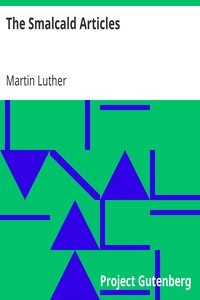| Author |
Luther, Martin, 1483-1546 |
| Translator |
Bente, F. (Friedrich), 1858-1930 |
| Translator |
Dau, W. H. T. (William Herman Theodore), 1864-1944 |
| Uniform Title |
Schmalkaldischen Artikel. English
|
| Title |
The Smalcald Articles
|
| Credits |
Produced by Allen Mulvey, and David Widger
|
| Summary |
"The Smalcald Articles" by Martin Luther is a theological document written during the early 16th century, specifically in the context of the Protestant Reformation. This work is essentially a collection of articles outlining Christian doctrine that Luther and his supporters would have presented at a proposed council. The book focusses on essential elements of faith, challenges various Catholic practices, and seeks to define the boundaries of acceptable belief versus what they view as corrupt or false teachings. The main content of "The Smalcald Articles" revolves around key theological points, such as the nature of God, the role of Jesus Christ in salvation, and the rejection of specific Catholic practices, notably the Mass and the invocation of saints. Luther emphasizes that salvation is achieved solely through faith in Christ, not through works or traditions. He argues against the authority of the Pope and the necessity of certain rituals that he deems unbiblical, advocating for a direct relationship between the believer and Christ. Ultimately, these articles serve as a significant declaration of Lutheran beliefs and an analysis of the failings of the Catholic Church, providing a clear articulation of the emerging Protestant faith during the Reformation. (This is an automatically generated summary.)
|
| Language |
English |
| LoC Class |
BX: Philosophy, Psychology, Religion: Christianity: Churches, Church movements
|
| Subject |
Lutheran Church -- Doctrines -- Early works to 1800
|
| Subject |
Lutheran Church -- Relations -- Catholic Church -- Early works to 1800
|
| Subject |
Catholic Church -- Relations -- Lutheran Church -- Early works to 1800
|
| Subject |
Lutheran Church -- Creeds -- Early works to 1800
|
| Category |
Text |
| EBook-No. |
273 |
| Release Date |
Jun 1, 1995 |
| Most Recently Updated |
Feb 6, 2013 |
| Copyright Status |
Public domain in the USA. |
| Downloads |
555 downloads in the last 30 days. |
|
Project Gutenberg eBooks are always free!
|

